Cloud computing in healthcare has seen accelerated growth during the COVID pandemic. It has forced the healthcare sector into adopting cloud solutions for many of its regular operations, especially towards providing a secure digital platform to store, manage, and share real-time medical data.
It provides healthcare professionals an easy way to diagnose/treat patients at any time as individuals with cloud credentials can access this data remotely from any location.
Cloud computing also promotes collaboration between medical professionals globally. A doctor can share real-time patient data with other medical professionals for various purposes like second opinions, better treatment recommendations, and exchange notes in real-time.
That is why the healthcare cloud computing market is predicted to keep growing in the coming years. MarketsandMarkets reports the value of the global healthcare cloud computing market to be around $39 billion in 2022 and it may reach $89 billion by 2027 with a CAGR of 17.8%.
In this article, we will be diving into the meteoric rise of cloud computing in healthcare and how it benefits the sector.
What is Cloud Computing?
Cloud computing is a process where computing services like servers, storage, databases, and software are made available on the Internet. It is a network of remote servers that secures and simplifies data storage, management, and transfer.
For example, you can access medical documents from any location and with a few clicks once you store them on the cloud. This, in turn, removes the need for storage space or physical presence at a particular location to access the required data.
What is Cloud Computing in Healthcare?
Cloud computing in healthcare is a process that utilizes a network of digital servers to store, manage, and access medical information remotely. It has the potential to transform the methods of delivering healthcare solutions worldwide. Medical professionals can efficiently counter many threats at the back of cloud solutions like the global exchange of data and medical research. For example, an AWS case study states that a global biopharmaceutical company, Bristol-Myers Squibb increased the efficiency of its clinical trials and treatment by 98% with cloud-based medical simulations.
Over time, the technology has been known to promote a 360-degree collaboration between medical professionals, patient-centric solutions, and data-driven operations in the healthcare sector.
Types of Cloud Computing Services in Healthcare
Healthcare cloud computing takes different forms to meet the requirements of multiple healthcare institutions. You can analyze both of them to figure out which one suits your needs.
- Distribution Model
Software as a Service (SaaS): An IT infrastructure you can pay for and access over the internet. It eliminates the need to download any software or use up the storage space of any of your physical servers.
Infrastructure as a Service (IaaS): It provides storage, network, and compute resources on a pay-as-you-go basis. Medical institutions can pay for the IT infrastructure as and when required.
Platform as a Service (PaaS): You get a platform with an operating system, applications, IT infrastructure, and other required components.
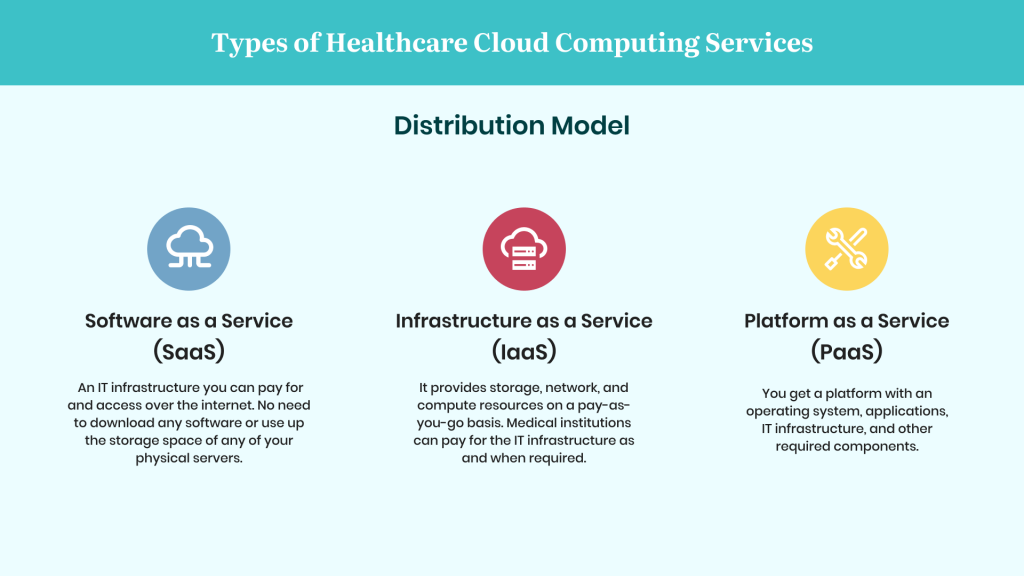
- Deployment Model
Community: Cloud access is available to a group of medical institutions with similar operations and requirements.
Private: Cloud access is only available to one specific healthcare organization/institution.
Hybrid: Hybrid cloud provides access to multiple clouds public and private. A healthcare institution can use hybrid cloud systems to create different platforms for healthcare professionals and patients.
Public: Anyone can access the cloud and pay for its services/resources.
Before you integrate the technology with your operations, knowing all the advantages and disadvantages of cloud computing in healthcare will prove immensely helpful for taking a calculated decision.
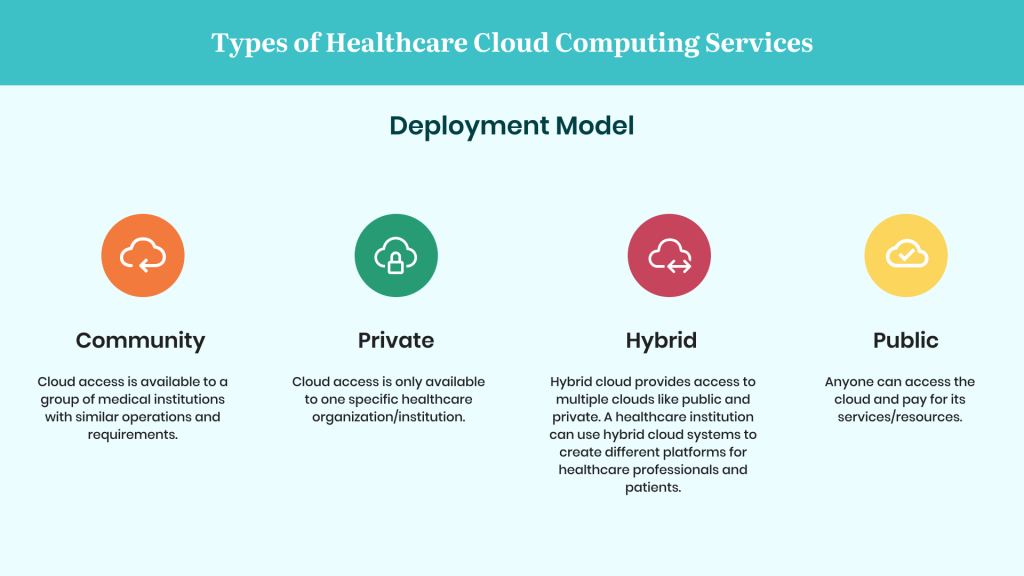
Benefits of Cloud Computing in Healthcare
You will know what to expect from a healthcare technology like the cloud if you know how it can benefit the operations of your medical institution.
Improved Data Security
Every healthcare institution faces the probability of a hacked patient information security. Migrating to the cloud can solve this problem as the cloud has better security measures like Data Encryption, Web Application Firewall, Data Protection, Zero-Trust Network Security Controls, Identity Access Management (IAM), automated upgrades, and logging tools.
Additionally, healthcare institutions can protect sensitive medical data with various security protocols enforced by cloud providers. Here are the frameworks cloud services conform to in order to improve their security:
- General Data Protection Regulation: GDPR promotes better data management and protects sensitive patient data.
- Health Insurance Portability and Accountability Act (HIPAA): Benefits of HIPAA compliance work around Private Healthcare Information (PHI) loss prevention, improved patient safety culture and telemedicine, and secure data portability.
- HITRUST CSF: It provides benefits like information security, risk prevention and management, and regulatory compliance.
- Cloud Compliance: It is compliance with the cloud usage regulatory standards that address both national and international laws.
A healthcare institution can also lose data in case of equipment failure and accidents. Migrating to the cloud prevents this as the stored data is on a remote digital server. Cloud computing also includes data backup and recovery protocols as well. This backup protects and restores data when it is deleted or lost for any reason.
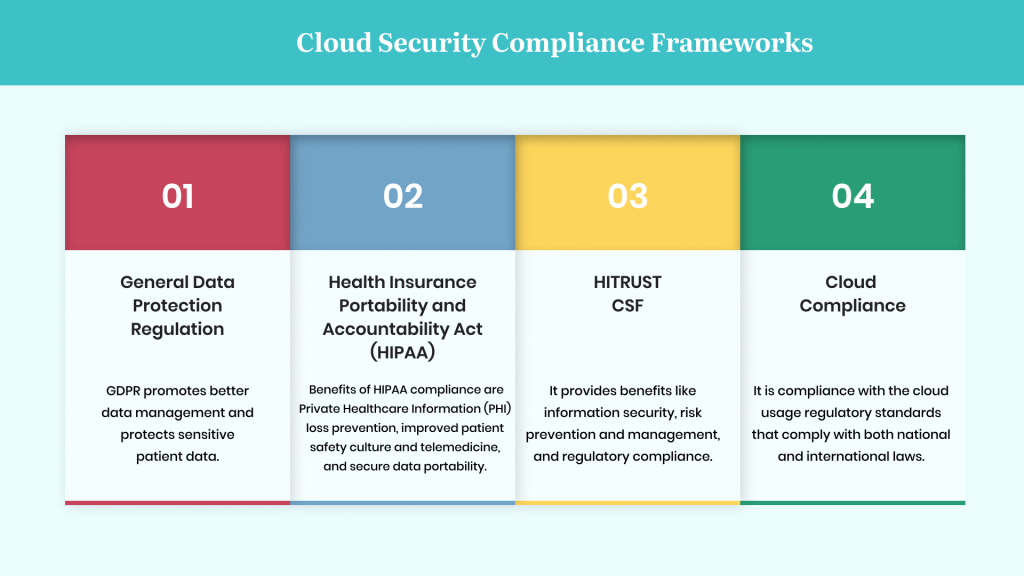
Cost-effective Solutions
Physical servers and data require filing cabinets, boxes, and storage units. Cloud computing only requires you to pay a fair price for the storage services available on the internet. You can access the data from anywhere in the institution or another location once you migrate to the cloud. Cloud computing also saves money by promoting lower administrative fees and improved productivity.
Better Scalability
Applications of cloud computing in healthcare are capable of supporting a requirement where the healthcare institution may need to reach and manage a heavy inflow of patients and need more resources and storage space.
For example, the covid pandemic required many hospitals to handle more patients than usual. Keeping track of the additional patients’ data without a trained staff could have been next to impossible without the cloud. Only a few clicks are required in cloud technology to increase its data storage capacity, resources, and computing abilities. Moreover, it’s possible to add more resources to the cloud while increasing its computing power and storage.
Artificial Intelligence and Machine Learning Assistance
Artificial intelligence and Machine Learning can simplify tasks like getting real-time data, medical diagnoses, and treatment by analyzing patient records. AI can also conduct predictive analysis by evaluating large amounts of complex data in a few seconds/minutes. That is why many cloud platforms come with the facility of integrating AI and ML technology for healthcare operations.
It can help with quick diagnosis/treatment, evaluation of complex medical conditions, and clinical decisions that otherwise take time. AI and ML can also analyze past and present patient data/behavior to predict the possibility of diseases in the future to help prevent them.
You can get AI-based cloud technology when building a medical app with the assistance of any recognized healthcare app development company.
Improved Collaboration
Cloud computing in the medical field provides live messaging resources to share real-time information and data files. That is how it promotes the exchange of information between multiple doctors and caregivers. It helps a healthcare professional get a second opinion, exchange notes on the same diagnosis, and collaboratively decide the best treatment for a patient in dire need.
The improved collaboration between healthcare institutions and doctors leads to highly effective medical solutions for many patients.
Improved Data Accessibility
The use of cloud computing in healthcare includes remote servers that provide easy-to-access data over the Internet with solutions like electronic health records (EHR). You can store various patient and other medical documents on the cloud and access them anytime or anywhere you need them.
Medical professionals need quick access to data to provide better diagnosis and treatment to critical patients. The cloud can provide easy access to large amounts of complex data with the assistance of AI and ML. This kind of convenience is something that physical documents and storage spaces do not provide.
Better Medical Care
The cloud provides access to all medical professionals, staff, and patients even when they are not at a hospital or office. Benefits like data accessibility and AI enhance the effectiveness of all medical solutions provided to patients through uninterrupted care. The cloud also has a risk analysis system that helps assess the potential dangers of any treatment, which can help save more lives and improve the reputation of your medical institution.
Cloud solutions like telemedicine, digital libraries, clinical decision support system (CDSS), and cloud computing bioinformatics give a bleeding-edge advantage to the healthcare sector.
Unlimited Data Storage
Healthcare institutions have medical documents, patient records, patient portals, medical applications, clinical data, and medical research data. This data keeps increasing in size as more and more patients come, stay, and go. Cloud computing can provide unlimited storage space for all the data you need to store while protecting your institutions from the expensive costs of physical storage spaces/servers.
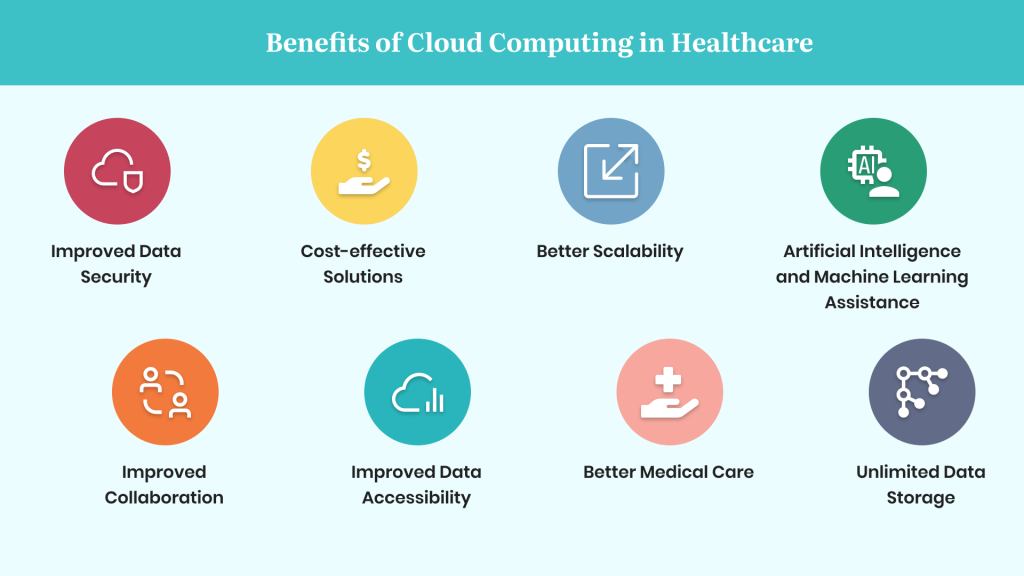
Disadvantages of Healthcare Cloud Computing
Knowing the disadvantages helps monitor any errors that may happen during regular healthcare operations through the cloud.
For example, a researcher reported to DataBreaches.net on August 2, 2020, about a misconfigured Amazon S3 storage bucket discovery. The bucked contained and leaked over 10,000 files with patient health data overseen by BioTel Heart, the cardiac data company.
Shared Control & Access
The cloud service provider may have more control and access to the cloud infrastructure than the medical institution. They also regularly have to monitor the cloud to ensure its proper functionality. It can incite worry in healthcare institutions about an invasion of privacy and a lack of total control over the cloud infrastructure.
Cloud service providers include contracts and compliance laws with the cloud infrastructure to guarantee the prevention of any invasive activity from the providers. But unauthorized access is always a possibility in any IT infrastructure provided by cloud service companies.
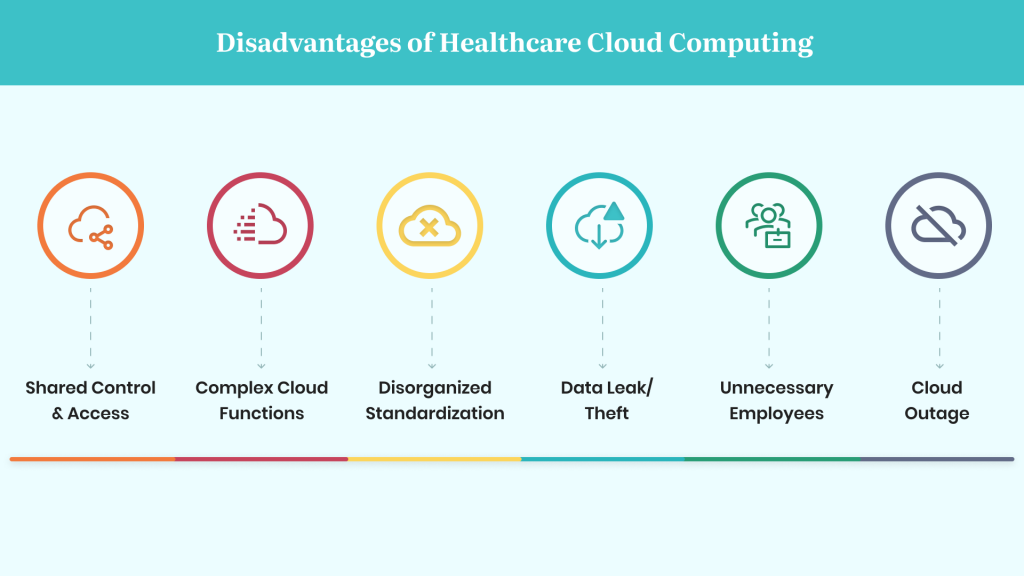
Complex Cloud Functions
Cloud technology may simplify the operation of the healthcare or financial sector but some medical professionals or staff members may take a long time to learn the functions of its various resources. It is a consequential impact of cloud computing on healthcare professionals and workers.
The hospital staff with no experience in IT could struggle with the cloud functions for a long time and this will only lead to the misuse of cloud resources. Moreover, a staff member could also analyze the patient records incorrectly, causing a life-threatening situation for patients.
Disorganized Standardization
The cloud infrastructure can be accessible by many local and international parties in the medical profession. Certain US states have different privacy laws and regulations and some international medical institutions may not be required to adhere to the same standard as your healthcare institution.
All of this can open the operations of your healthcare institution to many vulnerabilities such as lack of proper collaboration, exchange of incorrect or unverifiable data, data theft, invasion of privacy, and data misuse.
Data Leak/Theft
Cloud technology has many security protocols and compliance laws to protect patient data (as mentioned above). But data stored on a digital server is always vulnerable to the skills of a good hacker who can find weaknesses in any perfect system. Healthcare institutions also avoid choosing the cloud due to its compliance requirements like HIPAA. However, the cloud still has the best security you can use to store and protect sensitive data.
Job Security
The jobs of some hospital employees may become obsolete due to the cloud. For example, physical servers and data storage may require many staff members for proper management but cloud storage does not require a team of many members for the same work. It will force you to let some staff members go to manage hospital budgets and resources.
Cloud Outage
Almost every digital platform faces downtime at some point due to multiple reasons like power loss, internet connectivity issues, or cloud maintenance. The only difference is that healthcare institutions face significant life-impacting risks due to cloud outages.
Healthcare services are required 24/7 in all hospitals and they cannot afford to have a lack of patient data, AI assistance, or assistance from other medical professionals at a time when it may save the lives of patients. These institutions will need a contingency plan for cloud outages since they are unavoidable.
Conclusion
Cloud computing in healthcare has many benefits that outweigh its disadvantages but take certain precautions before choosing the cloud for your healthcare institution. When implemented right, it will help you modernize your healthcare service according to current needs and consecutively prepare your institution for the risks associated with it.
You should also hire the expertise of a good mobile app development company to ensure the best healthcare cloud infrastructure.
Frequently Asked Questions
Cloud computing provides a network of digital servers for healthcare institutions to store, manage, and access data remotely. It removes the need for physical storage spaces and servers. Cloud computing also improves collaboration between medical professionals worldwide and the diagnosis/treatment provided to customers.
Cost-effective solutions by removing the need for physical storage spaces, data protection, improved analytics, unlimited data storage, better medical collaboration, and increased business value are a few benefits of integrating healthcare with the cloud.
Cloud computing in healthcare leads to better patient diagnosis/treatment, a global collaboration between medical professionals, access to real-time data, AI assistance with diagnosis, medical research, disease prevention, and patient diagnosis/treatment, electronic health records (EHR), and unlimited storage space for increasing medical records/documents.
Integration of cloud computing with healthcare operations leads to personalized solutions for patients. Its easy-to-access data and AI technology make it hassle-free to provide better diagnosis and treatment solutions.
The cloud also provides a way to improve the collaboration of your healthcare institution with various local/international medical professionals and institutions. These factors lead to an increase in the business value of many healthcare institutions.


















.png)
.png)
.png)



Thanks for sharing.
I read many of your blog posts, cool, your blog is very good.